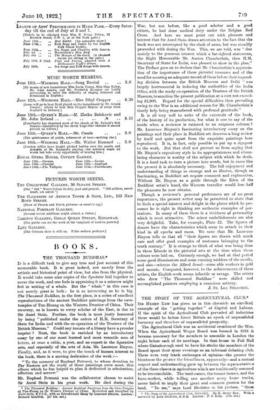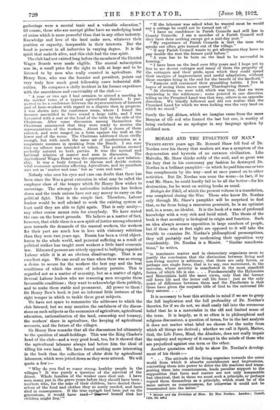THE STORY OF THE AGRICULTURAL CLUB.* SIB HENRY REW has
given us in this chronicle an excellent example of the " getting together " of. Capital and Labour. If the spirit of the Agricultural Club pervaded all industries there would. be before Great Britain an epoch of unparalleled harmony and therefore of unparalleled prosperity.
The Agricultural Club was an accidental oreationof the War. When the Agricultural. Wages Board wag- formed in 1918 it became necessary for the members to assemble in London the night before each of its meetings.. In titer/. house- in Pall Mall where Gainaberough used to have- his studio the members of the Board spent their spare evenings- as an informal debating club. There were very frank exchange*. of opinion:-the- greater the bluntness the greater the friendliness, apparently—and a mutual respect and_ understanding. grew up between the representatives of the-three classes-in agriculture which are traditionally assumed to be irreconcilable. The land-owner, the tenant farmer, and the farm-worker, while- telling one another many home truths, never- failed to imply their great and. common passion for the land: " To, me," says. Lord Bledisloe in his- preface, " these • The Story of the Agricultural Club, 1918-1921. By IL Henry Hew. With a foreword by Lord Bledisloe, K.B.E. London : P. S. King. [105. net.] gatherings were a mental tonic and a valuable education." Of course, those who are ascripti glebae have an underlying bond of union which is more powerful than that in any other industry. Knowledge and love of the land make men, -whatever their position or capacity, inseparable in their interests. But the bond is present in all industries in varying degree. It is the
spirit that maketh alive, and this club had the true spirit.
The club had not existed long before the members of the District Wages Boards were made eligible. The annual subscription was 58., a. small price for the right to talk at large and to be listened to by men who really counted in agriculture. Sir Henry Rew, who was the founder and president, points out very truly how much good fellowship eases industrial diffi- culties. He compares a chilly incident in his former experience with the smoothness and conviviality of the club :-
" A year or two ago I had occasion to attend a meeting in the market town of a typical agricultural district. It pur- pertcd to be a conference between the representatives of farmers and of farm-workers with regard to a dispute then in progress. I was shown into the conference room, where I found the farmers assembled in force round a large table, and I was honoured with a seat at the head of the table by the side of the Chairman. After some discussion among themselves the Chairman announced that they were ready to receive the representatives of the workers.. About half a dozen of them entered, and were ranged on a form against the wall at the lower end of the room. The Chairman addressed them civilly enough, but with much the same air of condescension as a magistrate assumes in speaking from the Bench. I am sure that no offence was intended or taken. The position seemed perfectly natural to both parties. It was the normal and habitual relation of master and man in discussion. The Agricultural Wages Board was the expression of a new relation- ship. It was a body formed to discuss and decide certain vital economic questions affecting Agriculture, and its members met not as master and man ' but as man and man.' " Nobody who uses his eyes and cars can doubt that there has been since the War a great extension in what may be called the employer class of the temper which Sir Henry Raw -wishes to encourage. The attempt to nationalize industries has broken down and the trade unions have not any money to carry on the political fight. That is the simple fact. Therefore, Labour
leaders would be well advised to work the existing system at least until they are able to fight again. That is only sanity— any other course means ruin for everybody. We have stated the case on the lowest grounds. We believe as a matter of fact, however, that while there is a new spirit of justice among educated men towards the demands of the manual workers, the workers for their part are much less in love with visionary solutions than they were two years ago. Russia has been a vivid object- lesson to the whole world, and personal suffering as a result of political strikes has taught most workers a little hard economic law. Educated persons are utterly opposed to bullying organized Labour while it is at an obvious disadvantage. That is an excellent sign. We can recall no time when there was so strong
a desire to secure for the workers the best pay and the best conditions of which the state of industry permits. This is
regarded not as a matter of necessity, but as a matter of right. Several Labour leaders who are reasonirg men recognize these favourable conditions ; they want to acknowledge them publicly, and to make them stable and permanent. All power to them ! Sit Henry Rew's book it just an informal little instance of the right temper in which to tackle these great subjects.
We have not space to summarize the addresses to which the club listened, but we may mention the usefulness of the discus- sions on such subjects as the economics of agriculture, agricultural education, nationalization of the land, ownership and tenancy, the workers' share in agriculture, the keeping of agricultural accounts, and the future of the villages.
Sir Henry Rew remarks that all the discussions led ultimately to the question of small-holdings. This was the King Charles's head of the club—and a very good head, too, for it showed that the agricultural labourer always had before him the ideal of tilling his own land. We have found nothing more interesting in the book than the collection of obiter dicta by agricultural labourers, which were jotted down as they were uttered. We will quote a few :-
" Why do you find so many strong, healthy people in the villages ? It was purely a question of the survival of the fittest. Whole families of the weaker ones died out. I have seen many put in the grave years before they should have been ; mothers who, for the sake of their children, have denied them- selves of the food and clothes they so sorely needed, and have died in consequence. If the true epitaph had been put on the gravestone, it would have read—' Starved herself that her children might live."' " If the labourer was asked what he wanted most he would say a dottage he could not be turned out of." " I have no confidence- in Parish CoUncils and still less in County Councils. I am a member of a Parish Council and they have done nothing except get a mid-day post." • . " My experience of Parish Councils is that the man who speaks out often n gets tupicevd otaut to get the village."
get allotments they have to pay double the rent the farmer paid before.". " A man has to be born on the land to be successful in farming." " I have been on the land over fifty years and I hope yet to live to see decent cottages and many of them the property of the cottagers and their pride, upon which they could spend their energies of improvement and useful adaptation, without those energies being in the end for the benefit of the landlord." " Farmers still continued their grumbling habits. I live in hopes of seeing them move nearer Thanksgiving Street."
" At elections we were told, which was true, that we were wandering in the wilderness ; some pointed in one direction telling us the Promised Land was that way, others in an opposite direction. We blindly followed and did not realize that the Promised Land for which we were looking was the very land on which we stood."
Surely the latt dictum, which we imagine came from the same Bunyan of the soil who framed the last but one, is worthy of being enshrined as an apologue in any language spoken by civilized men.



































 Previous page
Previous page